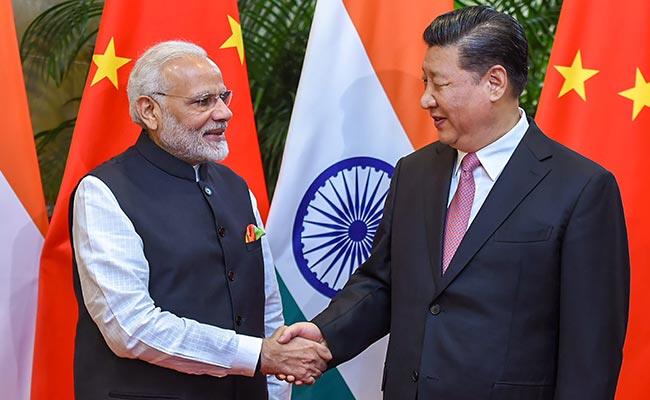China Counters Trump By Mending Fences From Japan To India

When Chinese Premier Li Keqiang smiled and clinked glasses with Japanese Prime Minister Shinzo Abe at a reception in Tokyo last week, it served as a reminder of just how rare these types of warm gestures have been between the Asian neighbors.
The first visit by a Chinese premier to Japan in seven years was the latest step in Beijing's attempt to shore up fraught ties with other powers to counter escalating tensions with the U.S. It came after an equally congenial visit to Indonesia, and Chinese President Xi Jinping's unexpected rapprochements with Indian Prime Minister Narendra Modi and North Korea's Kim Jong Un.

Threatened by looming trade sanctions from Washington, China is seeking support from other nations to counter U.S. pressure. A Chinese official told Bloomberg News last month that the government was considering offering major concessions on trade and investment to the European Union and countries such as Japan and Mexico.
'Bad Situation'
"China is trying to make an opportunity out of a bad situation. The Trump administration's moves on trade could negatively affect the Chinese economy at a time when it faces many internal challenges," said Mary Gallagher, director of the Center for Chinese Studies at the University of Michigan. "But the U.S. has also antagonized many of its important trading partners and allies, so China is smart to try to counter the U.S."
The shift has required China to lay aside some of its most intense foreign disputes. Chinese and Indian soldiers faced off in the Doklam region along their border last year and Beijing and Tokyo still haven't resolved their 2012 confrontation over control of East China Sea islands that plunged relations to their lowest point in decades.
In Xi's meeting with Modi in April, the two emphasized that they would avoid border clashes. Meanwhile, Japan and China signed a memorandum on a maritime communication mechanism aimed at avoiding unintended clashes at sea.
"By changing the Japan-China relationship from one of competition to one of harmony, we can contribute greatly to the peace and stability of the Asian region, as well as to its prosperity," Abe told parliament Monday.
Lingering Disputes
How far China can take the strategy remains to be seen. Many of China's neighbors, including Japan and India, are concerned about Beijing's rising might, especially its willingness to use coercive economic policies to punish countries that run afoul of its goals. South Korea experienced that last year after deploying a U.S. missile shield.
Even as Xi and Li mend fences with Japan and India, they've seen tensions rise with Australia over its efforts to limit perceived Chinese political meddling. And revelations that missiles and other military equipment have been deployed on China's South China Sea outposts have rekindled concerns about its efforts to establish control over that disputed water body. In a demonstration of its growing military prowess, China's first domestically built aircraft carrier began sea trials Sunday morning, Xinhua news agency said.
"The smile diplomacy can be successful, but only within certain limits," said June Teufel Dreyer, a University of Miami political science professor and author of "Middle Kingdom and Empire of the Rising Sun" -- a 2016 book on China-Japan ties. "There are restraints on how much Beijing's willing to make concessions, as well as on other sides' willingness to make reciprocal gestures."
Japan Deals
Officials from Beijing are trying to cast themselves as defenders of the multilateral trade system, countering U.S.-led criticism of restricted access to Beijing's markets.
"Both China and Indonesia believe in globalization and free trade," Li told more than 600 business people at a China-Indonesia business summit earlier in the week, according to the official Xinhua News Agency. "We both support the rules-based multilateral trading regime and stand for equal consultation in settling trade disputes."
Li and Abe oversaw the signing of a raft of agreements, including one allowing the transfer of two crested ibises from China as a symbol of a friendship recovering from its worst crisis in decades. China also granted Japanese financial institutions the status of renminbi-qualified foreign institutional investor, enabling them to directly invest in Chinese securities and finally placing Japan on the same footing as Western economies.
Abe accompanied the Chinese premier on a trip to the northern island of Hokkaido, where they emphasized business ties by touring a Toyota Motor Corp. plant together. The visit underscored the shared interest in free trade between the world's second- and third-largest economies.
"The current tension between China and the U.S. has required China to have a greater degree of interdependence with its neighbors," said Yang Bojiang, deputy director of the Institute of Japanese Studies at the Chinese Academy of Social Sciences, a state research institution. "The strengthening of China's international cooperation is a response to U.S. trade protectionism, unilateralism, and other trends that do not conform to the times."
(This story has not been edited by NT staff)
Source: https://www.ndtv.com/world-news/chinas-smile-diplomacy-with-india-japan-to-counter-trump-1851653



Post Comment
No comments